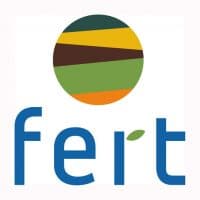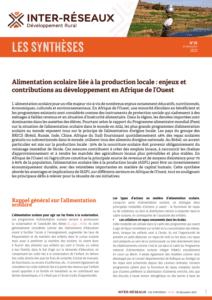Represented by
Name : Anne Panel
Position: Director Fert
Email : a.panel@fert.fr
Phone : 0144311670
An agricultural engineer, Anne Panel held positions as a project manager in a professional agricultural organization (Union régionale porcine Rhône Alpes) and in a consulting firm (Cédrat Développement) in France, before joining the Fert association to contribute to the agricultural development of Madagascar as a volunteer for international solidarity.
In 2003, she joined the head office of the Fert association, an agri-agency created in 1981 on the initiative of leaders of professional agricultural organizations and other personalities concerned with the agri-food problems of developing countries. Initially in charge of projects for sub-Saharan Africa and Madagascar, she took over the management of the association in 2007.
Anne Panel is an administrator of Coordination Humanitaire et Développement (CHD) and AgriCord (international network of agri-agencies).
She is a member of the Board of the Institute of Hot Regions (IRC) of Montpellier SupAgro as a qualified personality.
Presentation of the member
Fert is a French association for international cooperation for agricultural development in developing and emerging countries. Its aim is to help create the conditions in these countries that will enable farmers to improve their living and working conditions and contribute to ensuring food security in their countries.
Fert supports farmers in the creation of organizations (producer groups, cooperatives, agricultural credit unions, training centers, etc.) enabling them to find sustainable solutions to the problems they encounter in the exercise of their profession and the defense of their interests.
Fert conducts some twenty field actions in 12 countries in which it mobilizes agricultural leaders and technicians in a spirit of solidarity to share their experience of professional commitment and management of their organizations.
Fert's mission is to contribute to the improvement of agricultural economies in developing and emerging countries.
His approach is based on three key considerations:
The agricultural economy of a country is fundamentally based on farmers. Their vocation is to feed their country and to do so they must be able to make a living from their work.
The farmer is a responsible entrepreneur who is capable of reasoning out the many decisions he has to make, according to his own objectives and constraints. He must be considered and respected as such.
Each farmer has only a weak power. It is by grouping together in adapted organizations that farmers can : - find common solutions to common problems and manage the implementation of these solutions, - influence the technical, economic and political environment through participation or negotiation, in order to defend common interests.
Fert supports the creation or development of producers' organizations with the strong conviction that they can only be born and consolidated in a permanent interaction between concrete achievements providing sustainable services to their members (technical, commercial, financial actions...) and the associative animation of these members.
To achieve this, Fert has to act in the long term and with continuity. Indeed, involvement with partners in the construction of human organizations implies being prepared to stay with them for the time necessary to accompany the slow evolution of mentalities that allows these organizations to achieve autonomy.
Fert, as an agri-agency (an international cooperation organization created by the agricultural profession), acts as an interface between action in the field and all the professional skills to be mobilized according to the needs expressed. It proposes to put at the service of farmers in developing countries the know-how acquired during more than sixty years of experience in organizing producers in the technical, economic, commercial and financial fields. To do so, it relies on all the French professional agricultural organizations (chambers of agriculture, agricultural cooperatives, specialized technical institutes, mutual credit societies, etc.).
It bases its approach on three principles drawn from the peasant experience: rigor, pragmatism and solidarity.
In 2014, Fert works alongside farmers in 14 countries:
- Albania
- Algeria
- Belarus
- Burkina Faso
- Ivory Coast
- Egypt
- France (education for rural development and international solidarity in the agricultural high schools of the CNEAP network)
- Georgia
- Kenya
- Madagascar
- Morocco
- Sudan
- Tanzania
- Tunisia
Agricultural development
- Shared development
- Fert, a history, an approach (2011)
- Educator's Guide [EADR-SI] (2014)








